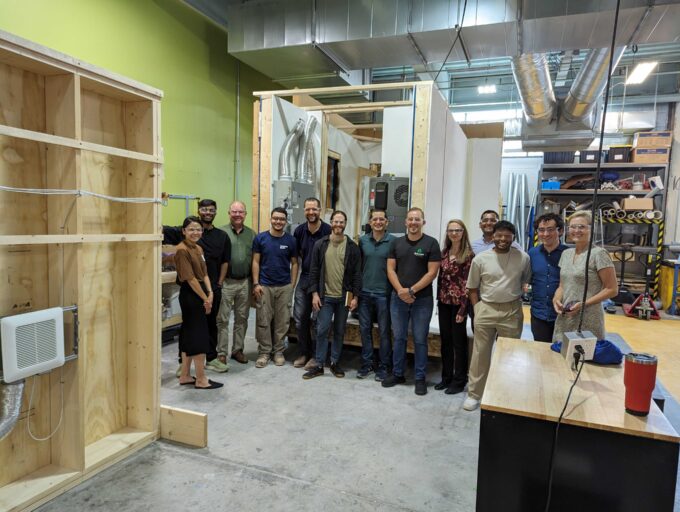When Vikas Enti became a father to twins two years ago, he asked himself, “How can I be spending my time to make my kids proud?”
The answer turned out to be tackling the twenty-seven percent of annual GHG emissions associated with building operations and new building construction through a combination of net-zero homes and advanced modular construction with robots.
Prefabricated, or modular, construction—where the building components are manufactured off-site in modular sections that can then be assembled—is 30 to 50 percent faster than on-site construction, according to Enti, and has the climate benefits of fewer transportation-related emissions and less wasted material.
But today’s multifamily prefab factories have drawbacks. They’re massive and expensive, taking a few years to construct and needing to serve a large area—often a 500-mile radius. They can’t quickly customize builds to meet individual municipalities’ needs, and like on-site construction, are reliant on a workforce that’s facing mass retirement.
Reframe Systems—co-founded by an ex-Amazon Robotics trio of Enti, Aaron Small, and Felipe Polido—is addressing these problems, ushering in a new era of cost-effective, net-zero, and highly scalable prefab homes. Here’s how:
- Microfactories: Reframe Systems’ proprietary construction innovations allow it to build “microfactories” that are a fraction of the size of typical prefab factories—with greatly reduced costs and setup times. These microfactories are much closer to the build sites they serve, meaning lower transportation-related emissions.
- Increased production speed: Thanks to a combination of software guided workstations, robotic workflows, and the startup’s construction innovations, Enti says Reframe Systems aims to assemble a building module in under four hours by 2025, compared to the current standard of 12-14 days.
- Agile construction and “mass customization”: Reframe Systems is building towards the holy grail of prefab construction: high production volumes, low capital and operating expenses, and the ability to manufacture a high mix of products and change designs quickly based on customers’ needs. The team is borrowing inspiration from the high-mix, high-volume world of e-commerce fulfillment instead of the low-mix, high-volume manufacturing environment.
- Net-zero emissions: Reframe Systems has worked with consultants to ensure its builds meet Passive House standards, and is using unconventional insulation materials to make its homes greener. Prefabrication’s precision allows the startup to create airtight structures, and Reframe Systems aims for its buildings to be fully electric and powered by clean energy.
- Scalability: Scalability for prefab factories hinges on two components: how quickly can you build factories, and how much can each factory produce. Reframe Systems can build one of its microfactory in under three months, compared to two to three years for a typical factory, and its vision-guided robotic work cell that costs $300k has similar capabilities as $5M of today’s technology. The startup’s high production speeds and agile construction abilities mean its microfactories have high throughput as well.
Reframe Systems focuses on multifamily homes and works with local developers and community development corporations. The startup is opening its first microfactory in Andover, MA this summer—clocking in at 17,000 square feet—and has three projects lined up with Arlington, MA and Somerville, MA for the first half of 2024.
Enti, Reframe Systems’ CEO, says the Andover facility will ultimately be able to produce up to 45 homes per year.
The nine-person, seed-stage startup is looking for additional developers that want to build net-zero homes; interested parties can reach out here.
Reframe Systems became a member of Greentown Boston in late 2022, and has found great value in the incubator’s Investor Program and prototyping lab offerings.
“We’ve had significant success with Jackie Firsty and the Investor Program, in terms of introductions to various types of capital partners, and then from Greg Ralich on the lab space side,” Enti says. “He’s been an excellent partner in helping us figure out how best to get our prototyping done, get it done safely, and maximize the value for our time.”


